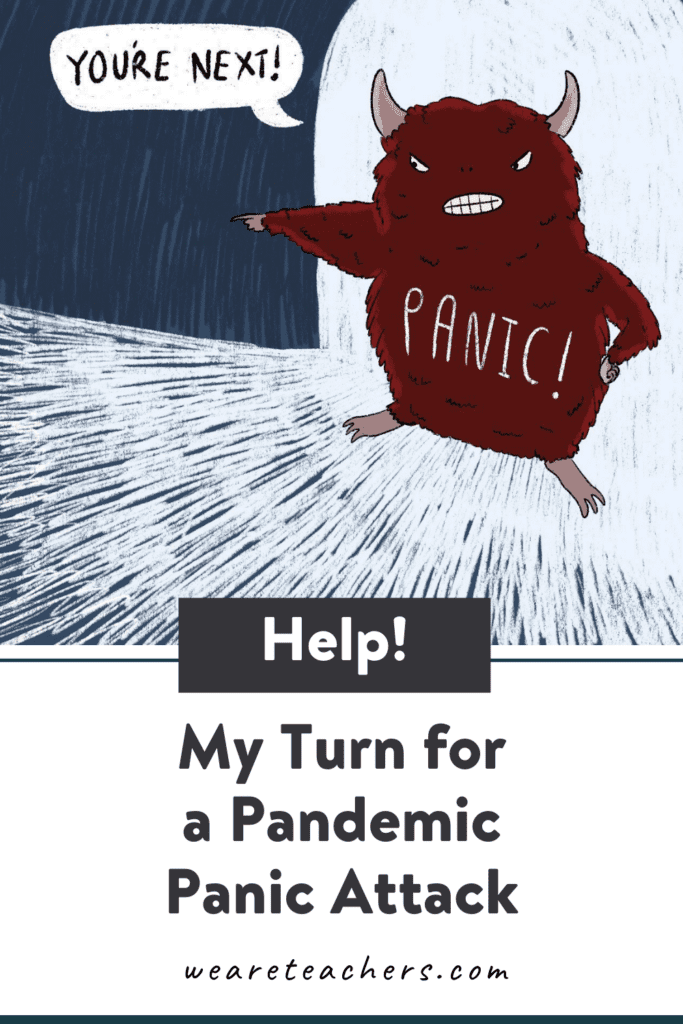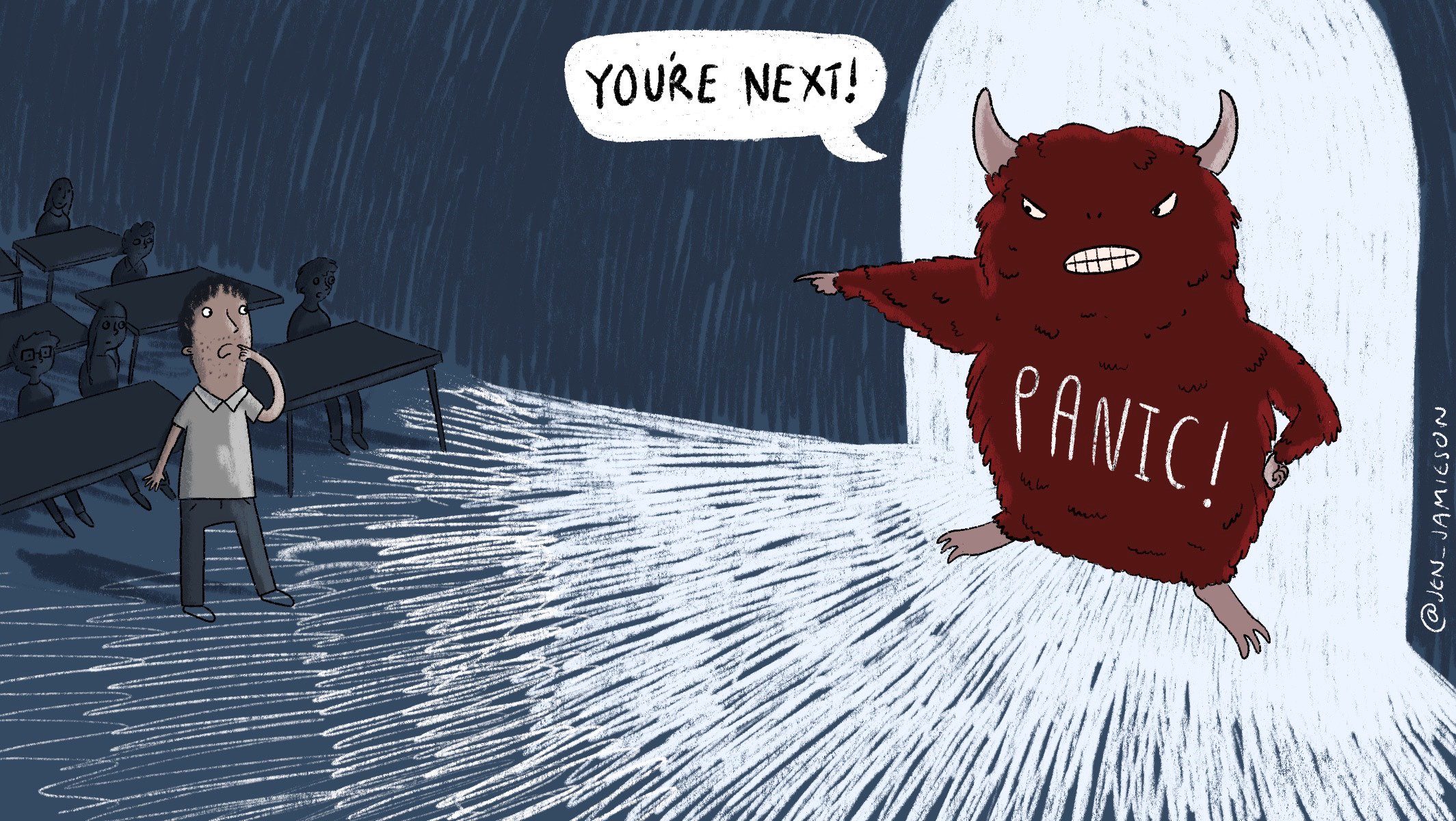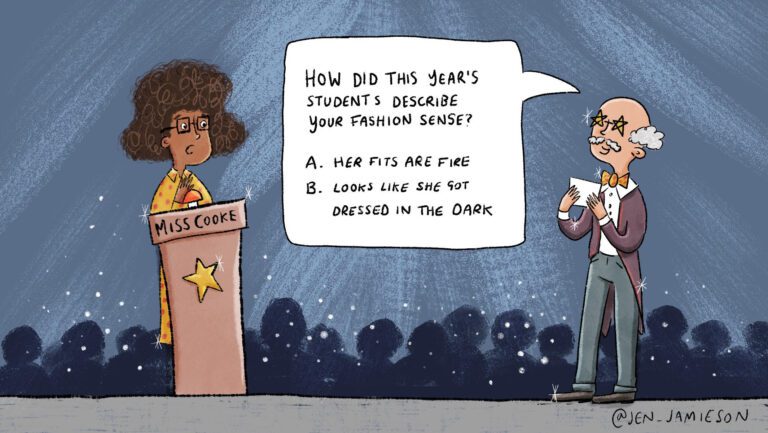Dear WeAreTeachers:
Well, it happened. I guess it was my turn to have a panic attack at school, lose it, and have to go home for a few days. It’s hard to pin it down to one single trigger. I think it’s a lot of things after two years of pandemic teaching. I figured I’d be the last one to crack and need a mental health day. A panic attack out of the blue at the end of lunch changed that, so here we are. My admin is supportive. Colleagues are supportive. I tried to get it back together and go to class, but the more I tried to talk myself into it, the more I was overcome by nausea. So, the overwhelming urge to puke forced me to blurt out, “I need to leave. I can’t be here right now.” Please tell me I’m not the only one. —My Turn
Dear M.T.,
I’m 100 percent certain that you are not alone. Please do your best to dissolve any feelings of embarrassment that are flaring up. We’ve ALL experienced moments where life catches us by surprise and humbles us big time. And yes, after two years of pandemic teaching, most educators are having bouts of burnout and overwhelm. What a relief to hear that your admin and colleagues are supportive.
Panic attacks are sudden episodes of fear that result in strong physical reactions, even though there is no real danger or clear cause. They can be super frightening! When a panic attack occurs, you might even feel like you are having a heart attack. People often feel a rapid heartbeat, nausea, shaking, chest pain, and major feelings of doom.
It’s difficult to pinpoint the triggers, but with hyperawareness and repeated experiences, you may start noticing situations that make you feel the panicky feelings. If you’ve had more frequent panic attacks and feel worried about the next one, it’s important to get professional help to get a solid treatment plan in place. It takes heaps of self-awareness, courage, and vulnerability to realize that a break is what you need. Good for you. Really. Your body was communicating to slow down and rest.
So what will you do to nurture yourself? There are various types of rest that we need beyond sleep. One example of respite is emotional rest, where we let go of all the people-pleasing and allow ourselves to express ourselves without inhibitions. Another type of nurturing involves sensory rest with a softening and break from bright lights, multiple conversations, computer screens, and background noise. It’s also important to engage in social rest and discern which relationships are draining and which feel supportive and positive.
Hopefully, your break will be brimming with quality rest so that you feel more like yourself and are able to regulate your everyday life circumstances. Glennon Doyle says, “Hard work is important. So are play and nonproductivity. My worth is tied not to my productivity but to my existence. I am worthy of rest.”
Dear WeAreTeachers:
It’s just so hard when I have to call CPS. One of my high school students revealed to me that his mom screams at and hits him. Recently, she pushed him, and he hit his head. He was trying to downplay the physical and verbal abuse and kept saying, “I know my mom loves me.” I also know that my student is reaching out for help. Here’s where it gets hard. His aunt works at the school in the counseling department. We have become solid colleagues. I talked to her about what’s going on, and she wants to handle things on her own without CPS getting involved. Now what do I do? —Feeling Paralyzed
Dear F.P.,
Reporting abuse, neglect, or exploitation to Child Protective Services is such a sobering aspect of our work as educator advocates. When kids reveal trauma, it’s a cry for help. I think we know that in our bones, but making the call can make us feel paralyzed. It sounds as though your heaviness is compounded by your colleague’s request for you not to involve CPS. That’s an extra load to carry.
As teachers, we are considered mandated reporters. “Mandated reporters typically do not investigate suspected abuse; rather, their obligation is to report their suspicions. For example, if a child discloses that a parent hit them, the mandated reporter does not reach out to the parent to confirm the report but instead reports the allegation.”
If this is your first time reporting your suspicion of abuse, a social service staff member will gather information from you. Then the team decides to accept the case and intervene if necessary. “These services are available to children and their families when children are victims of, or at risk of, abuse, neglect, exploitation, or parental absence … Abuse is defined as any of the following:
A child is:
-physically injured by other than accidental means.
-subjected to willful cruelty or unjustifiable punishment.
-abused or exploited sexually.
-neglected by a parent or caretaker who fails to provide adequate food, clothing, shelter, medical care, or supervision.”
After reading the examples of abuse, I think you will agree that the screaming, hitting, pushing, and head injury your student sustained likely fall under the CPS definition of abuse. Even though the social services systems are extremely taxed and sadly buried with cases, they will investigate. There are a variety of services to help. Generally, support lasts about one year for kids staying at home with their family. A longer time frame is provided to support reunification for children who have been removed from the home. In some cases, children do not have a safe home to return to, and CPS helps to place them in foster care.
Additionally, the economic and isolation pressures of the pandemic have many advocates worried. “Some social service experts fear that at-risk children won’t be seen because stay-at-home orders are keeping them away from the watchful gaze of mandated reporters, especially teachers, who report one in five cases of suspected abuse and neglect to hotlines and responsible agencies.” And I’m sure the student’s aunt is well aware that you are a mandated reporter and need to share your suspicions of abuse. This upsetting context is being made worse by the uncomfortable pressure your colleague is placing on you to not report.
And as far as the students saying, “I know my mom loves me,” author bell hooks has some words on this: “Abuse and neglect negate love. Care and affirmation, the opposite of abuse and humiliation, are the foundation of love. No one can rightfully claim to be loving when behaving abusively.”
Dear WeAreTeachers:
I have a para-professional who apparently doesn’t like how I teach. She told my co-teacher, “You have to help her with her planning.” She said this right after a station activity that went well (my co-teacher and I agree). This para usually sits in the back of the room on her phone, probably because her student is not here much of the time. If I ever email the para support teacher, she doesn’t respond. I invited her to my Google Classroom, and she didn’t even accept the invite. How should I handle this? Am I wrong for being frustrated that she is being critical while she just sits there? —Over It
Dear O.I.,
Team teaching can be terrific, but it can also be treacherous. We all know that mutual respect in the workplace is foundational for adults, kids, and families. Communication is at the core of improving your current team-teaching context and workplace conditions. We can’t just wish the problems away. So let’s explore a couple of proactive options.
Your admin team plays a crucial role with human resources issues at your site. You aren’t wrong to feel intense reactions based on the comments the para-educator made about your planning and lessons. You are human! Even though these comments about you needing help with planning may trigger you and make you feel frustrated, annoyed, or even angry, the bigger issue is that the support educator is minimally doing her job. We don’t need mediocre educators working with students. We desperately need educators who are conscientious, professional, collaborative, well-prepared, and willing to reflect, learn and grow. At this point, it’s important to let your principal know what’s going on. Have your co-teacher join you in sharing their observations and input, too. Try and keep your communication descriptive and stripped of opinion.
Hold on to your expectation of professionalism involving solid communication. Replying to emails is a BASIC part of being part of a team and is a primary way to be responsive to the needs of students. Your invitation to access Google Classroom is a minimal expectation and will directly support the student who needs one on one help. Definitely, there needs to be follow-up on these issues in the spirit of putting students first and nurturing a higher level of teamwork.
You may also want to talk to the para-educator directly. I think it’s helpful to invite a colleague to join you when there is this undercurrent of intensity. Consider reaching out to the support teacher and requesting to have a conversation to better support your student. Keeping the student at the forefront and discussing open-ended questions is a great place to begin. Here are some questions you can try: What’s going well? How do we know? What can we improve? What might this support look and sound like? Bring up that it’s important to reply to emails and join Google Classroom because the communication and collaboration between the team help the student. Reinforce the message that the more you all work together, the better support for the student in need.
So, in the spirit of putting students first, take some deep breaths and dive into the conversations that have the power to exponentially impact student social, emotional, and academic support.
Do you have a burning question? Email us at askweareteachers@weareteachers.com.
Dear WeareTeachers:
As a high school teacher, the special treatment our football team gets really gets under my skin. They’re incredibly well-funded and have tons of support staff. Meanwhile, I can’t afford lab equipment for dissections, and my only help is a TA. Plus, the players are always getting out of class for football-related events. The coaches pressure me and other teachers to let missing assignments slide and even massage their grades. I get that they’re important to kids, but I’m so tired of sports being the priority.Want more advice column? Visit our Ask WeAreTeachers hub.
Illustration: Jennifer Jamieson


